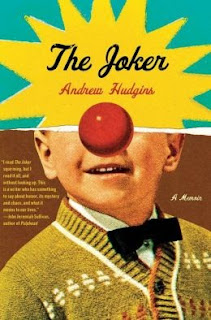 one year outside Paris before his father was transferred to Montgomery, Alabama, in 1966, the year after the Selma-to-Montgomery march. He has attended Huntingdon College, the University of Alabama, the Iowa Writers’ Workshop, and Stanford University. His poetry has been a finalist for the Pulitzer Prize and National Book Award. He lives in Columbus, Ohio, and teaches at The Ohio State University.
one year outside Paris before his father was transferred to Montgomery, Alabama, in 1966, the year after the Selma-to-Montgomery march. He has attended Huntingdon College, the University of Alabama, the Iowa Writers’ Workshop, and Stanford University. His poetry has been a finalist for the Pulitzer Prize and National Book Award. He lives in Columbus, Ohio, and teaches at The Ohio State University.Hudgins's new book is The Joker: A Memoir.
Late last month I asked the author about what he was reading. His reply:
Christopher Marlowe: Poet & Spy, by Park Honan.Learn more about The Joker, and follow Andrew Hudgins on Facebook.
Honan gives us complex portrait of a complex poet who made his living as a playwright and as a government spy. Marlowe’s recruitment into the secret service at Cambridge, his botched missions in Europe, and his abandonment by the agency after his patron dies, and his death in a ambiguous scuffle that may have been an assassination, sounds just like the plot of a John le Carré thriller. But Honan is careful to present Marlowe as a poet and playwright as much as an intriguer, and he traces the poet’s development and his importance in the evolution of English drama.
Birds of the Air, by David Yezzi.
There are many fine and engaging poems in David Yezzi’s Birds of the Air, but the one that has stuck in my head for the past three weeks is the long blank-verse narrative at the center of the book. “Tomorrow and Tomorrow” is the story of a waiter and wannabe actor who lands a role in theatrical company touring Macbeth through West Germany: “Every night/we died a dozen deaths on different stage.” The poem is often pointedly funny: “Our Banquo’s name is Bill” and “Duncan’s name is Neil.” But our narrator keeps in only sporadic long-distance telephone contact with his girlfriend in the States, and he is not a model of fidelity. As things spiral out of control, their failures in life play out against the backdrop of Shakespeare’s greater tragedy. Unlike their Macbeth, Yezzi’s “Tomorrow and Tomorrow” is a stunning success.
The Rook by Daniel O’Malley.
I was hooked from the beginning. Our heroine reads a note explaining that the note’s writer has erased her own essence and somehow lodged the note’s reader in her body. The note also informs her that as Myfanwy Thomas she is a senior operative in a secret society of paranormal agents, and by the way, if she has survived long enough to read the note, she has already survived several attacks on her life by a mole in the organization. Events move swiftly from there. The book is zippy, suspenseful, inventive, and often funny. I couldn’t put it down.
A History of Marriage, by Elizabeth Abbott.
A History of Marriage has a daunting subtitle: “From Same Sex Unions to Private Vows and Common Law, the Surprising Diversity of a Tradition.” The book, though, is not daunting at all. It’s a sprightly but careful and even-handed survey of the institution from every important angle, including from the perspective of those who remain “Unmarried and Often Single.” Abbott is a professor at the University of Toronto, and her knowledge of how marriage differs between the U.S. and Canada is one of the delights of the book. But as Henny Youngman says, “The secret of a happy marriage remains a secret.”
Writers Read: Andrew Hudgins (March 2009).
--Marshal Zeringue




